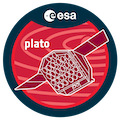Speaker
Description
The AutoRegressive Planet Search (ARPS) methodology is a pipeline for the analysis of space-based transiting data. It performs maximum likelihood fitting of low-dimensional ARIMA models to remove stellar and instrumental variations brief transits are largely unaltered. A novel Transit Comb Filter periodogram is applied to ARIMA residuals. Tests with simulations and real data show ARIMA+TCF is more sensitive to small planets than commonly used detrenders with the Box Least Squares periodogram. Several dozen time series features are used to train a decision tree classifier (Random Forests, XGBoost), followed by a multifaceted vetting procedure. ARPS has been applied to Kepler (KARPS) and TESS (DTARPS) data sets. The TESS application can identified dozens of hot Neptunes and Ultra-Short Period candidate planets. ARPS methodology can be an important complement to other pipeline procedures for PLATO planet discovery.

